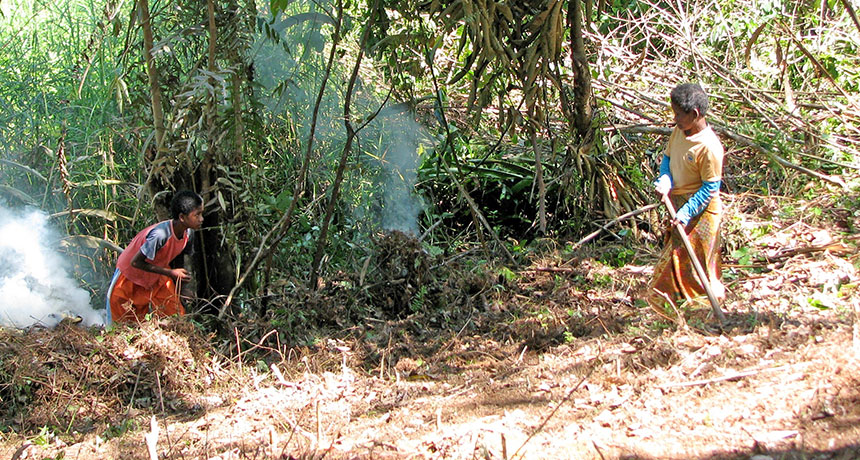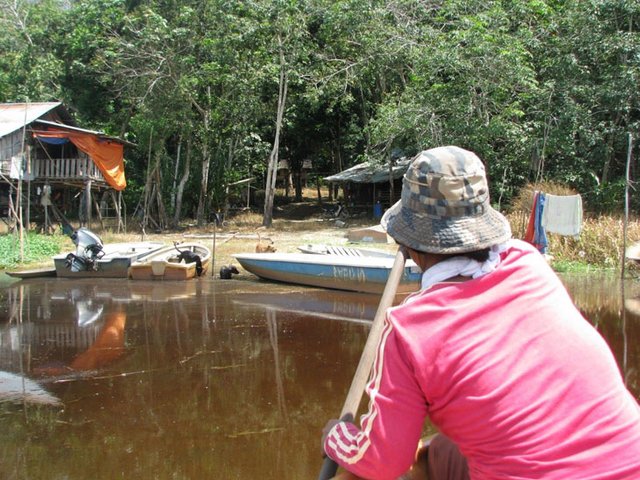Foraging communities in forests of the Malay Peninsula are better at identifying odors than their rice-farming neighbors

SCENT MASTERS Southeast Asian hunter-gatherer communities display an ability to name different odors not observed in Western nations or even in a neighboring farming group. Here, two of these hunter-gatherers clear an area to enable the growth of durian, a sweet-tasting but foul-smelling fruit.
Smell has a reputation as a second-rate human sense. But that assumption stinks once hunter-gatherers enter the picture.
Semaq Beri hunter-gatherers, who live in tropical forests on the eastern side of the Malay Peninsula in Southeast Asia, name various odors as easily as they name colors, say psycholinguist Asifa Majid and linguist Nicole Kruspe. Yet Semelai rice farmers, who live in forest outposts near the Semaq Beri and speak a closely related language, find odors much more difficult to name than colors, the researchers report online January 18 in Current Biology.
By including members of a farming community that inhabit a common forest environment and speak a similar language, the new study indicates for the first time that the cultural practices of hunter-gatherers help enhance their odor-naming ability — and possibly their smell-detection skills — relative to settled peoples.
Neuroscientist and odor researcher John McGann of Rutgers University in Piscataway, N.J., calls these results “unexpected and deeply interesting.” Genetics apparently interact with personal experiences of different smells and one’s cultural background to produce odor-naming abilities, McGann says.
Previous research has found that like Semelai farmers, Westerners describe colors far more easily than smells. People in Western societies often talk about odors by resorting to analogies, such as “It smells like banana.”
Semaq Beri hunter-gatherers usually used specific terms for a range of odors as well as colors, say Majid of Radboud University in Nijmegen, the Netherlands, and Kruspe of Lund University in Sweden. These forest dwellers are attuned to odors by virtue of their lifestyle and culture, the investigators propose.
That idea seems likely, since hunter-gatherers spend their lives deploying their sense of smell to hunt and avoid danger, says psychologist and clinical neuroscientist Johan Lundström of the Karolinska Institute in Stockholm. Majid and Kruspe’s study adds to evidence that “the more we use our sense of smell, the better it gets,” he says.
Story continues after image

LOST SMELLS In forests of Southeast Asia’s Malay Peninsula, farmers who live in structures such as these find it harder to name odors than colors, a difficulty neighboring hunter-gatherers don’t share.
Among the Semaq Beri, 18 individuals completed an odor-naming task for the study, and 16 of them also completed a color-naming task. Among the Semelai, 21 participants completed both tasks. Odor participants sniffed marker pens that emitted a total of 16 smells, including orange, leather, rose and fish. On the color task, participants viewed 80 differently hued chips and named 20 of them. Kruspe asked volunteers in their native language either “What smell is this?” or “What color is this?”
Hunter-gatherers used specific terms for odors (such as one translating as “musty”) 86 percent of the time. Colors elicited specific terms (such as a word for “blue”) nearly as often, 80 percent of the time.
In contrast, rice farmers employed specific odor words 56 percent of the time, versus specific color words 78 percent of the time.
Smells carry practical and spiritual importance for the Semaq Beri, Majid says. For instance, foragers must recognize the scent of tiger urine in the forest, a sign that the predatory cats are nearby. Hunters avoid killing certain prey that exude smells associated with pregnancy, so that these animals won’t die out. Semaq Beri religious beliefs hold that certain smells cause illness and others cure ailments. Brothers and sisters are warned not to sit too close together because their smells will mix. “This is considered a sort of incest,” Majid says.
Majid has coauthored previous studies that documented extensive vocabularies for smells in two other Malay Peninsula hunter-gatherer communities as well as among Mexican villagers who, until recently, hunted and gathered but now mix commercial fishing with plant foraging.
“Based on our results, I would predict that other contemporary hunter-gatherers also show better odor naming than non-hunter-gatherers do,” Majid says.
It’s not known whether Semaq Beri individuals display genetic characteristics linked to an especially keen sense of smell or if growing up in a foraging society boosts the activity of genes involved in odor perception.
Researchers need to examine whether childhood exposure to words that specify many odors strengthens hunter-gatherers’ scent-naming skills as adults, Lundström says. Further cross-cultural work should also include tests of sound-naming skills, he says.
Hi! I am a robot. I just upvoted you! I found similar content that readers might be interested in:
https://www.sciencenews.org/article/hunter-gatherer-lifestyle-could-help-explain-superior-ability-id-smells
Downvoting a post can decrease pending rewards and make it less visible. Common reasons:
Submit
This post has received a 0.16 % upvote from @drotto thanks to: @zumerret.
Downvoting a post can decrease pending rewards and make it less visible. Common reasons:
Submit
This post received a 0.021 SBD (0.29%) upvote from @upvotewhale thanks to @zumerret! For more information, check out my profile!
Downvoting a post can decrease pending rewards and make it less visible. Common reasons:
Submit
This post has been upvoted by @microbot with 1.0%!
Vote for my creator @isnochys as witness!
Downvoting a post can decrease pending rewards and make it less visible. Common reasons:
Submit
So you can like, train your sense of smell?
Downvoting a post can decrease pending rewards and make it less visible. Common reasons:
Submit
This post received a 0.88% upvote from @morwhale team thanks to @zumerret! For more information, click here! , TeamMorocco! .
STEEM Price : 5.463 $ ID : 1516305576000
Downvoting a post can decrease pending rewards and make it less visible. Common reasons:
Submit